- Home
- Tom Sharpe
Grantchester Grind
Grantchester Grind Read online
Contents
About the Author
Also by Tom Sharpe
Title Page
Dedication
Chapter 1
Chapter 2
Chapter 3
Chapter 4
Chapter 5
Chapter 6
Chapter 7
Chapter 8
Chapter 9
Chapter 10
Chapter 11
Chapter 12
Chapter 13
Chapter 14
Chapter 15
Chapter 16
Chapter 17
Chapter 18
Chapter 19
Chapter 20
Chapter 21
Chapter 22
Chapter 23
Chapter 24
Chapter 25
Chapter 26
Chapter 27
Chapter 28
Chapter 29
Chapter 30
Chapter 31
Chapter 32
Chapter 33
Chapter 34
Chapter 35
Chapter 36
Chapter 37
Chapter 38
Chapter 39
Chapter 40
Chapter 41
Chapter 42
Copyright
About the Author
Tom Sharpe was born in 1928 and educated at Lancing College and Pembroke College, Cambridge. He did his national service in the Marines before going to South Africa in 1951, where he did social work before teaching in Natal. He had a photographic studio in Pietermaritzburg from 1957 until 1961, and from 1963 to 1972 he was a lecturer in History at the Cambridge College of Arts and Technology.
He is the author of sixteen novels, including Porterhouse Blue and Blott on the Landscape which were serialised on television, and Wilt which was made into a film. In 1986 he was awarded the XXIIIème Grand Prix de l’Humour Noir Xavier Forneret and in 2010 he received the inaugural BBK La Risa de Bilbao Prize. Tom Sharpe died in 2013.
Also by Tom Sharpe
Riotous Assembly
Indecent Exposure
Porterhouse Blue
Blott on the Landscape
Wilt
The Great Pursuit
The Throwback
The Wilt Alternative
Ancestral Vices
Vintage Stuff
Wilt on High
The Midden
Wilt in Nowhere
The Gropes
The Wilt Inheritance
Grantchester
Grind
A PORTERHOUSE CHRONICLE
Tom Sharpe
To my daughters
Melanie, Grace and Jemima
without whom this book would
never have been written
1
‘Godber was murdered,’ said Lady Mary. ‘I am fully aware that you refuse to believe me, but I know.’
Mr Lapline sighed. As Lady Mary’s solicitor he was forced twice a year to listen to her assertion that her husband, the late Sir Godber Evans, Master of Porterhouse College, Cambridge, one of the University’s oldest foundations, had been deliberately done to death by or on the orders of the Dean, the Senior Tutor or one of the other Senior Fellows. Mr Lapline, a Cambridge man himself and a keen respecter of old institutions, particularly of old persons who had become institutions in their own lifetimes, found the accusation most distasteful. With a less wealthy and well-connected client he would have said so. Instead, and as usual, he prevaricated.
‘It is not that I refuse to believe it,’ he said. ‘It is just that, in spite of every effort we have made, and as you know we have employed private detectives at great expense to your good self, we have been unable to find a shred of evidence. And frankly –’
Lady Mary cut him short. ‘I am not in the least interested in what you have not been able to find out, Lapline. I am telling you my husband was murdered. A wife knows these things. All I require from you is proof. I am not a young woman and since you seem incapable of providing that proof …’ She left the solicitor dangling. It was all too obvious that she was not a young woman and, in Mr Lapline’s opinion, it was doubtful if she ever had been. It was the unspoken threat that was alarming. Ever since her recent illness she had, as Mr Lapline liked to put it – he was fond of borrowing the sayings of famous men – become an old woman in a hurry. In her present mood she was capable of anything. Mr Lapline was nervous.
‘In view of what the coroner said …’ he began but she cut him short again.
‘I know perfectly well what the buffoon said. After all I was there at the inquest too. And quite frankly it wouldn’t surprise me to learn that he had Porterhouse connections. Either that or he had been nobbled.’
‘Nobbled?’
‘Bought off. Bribed. Got at. Call it what you will.’
Mr Lapline shifted uncomfortably in his chair. His stomach was playing him up again. ‘I’d hardly call it any of those things,’ he said, ‘and I’d strongly advise you not to either. Certainly not in public. The damages for criminal slander can be enormous. Of course as your legal adviser I am prepared to listen but –’
‘But not, apparently, to act,’ said Lady Mary. ‘I have become fully aware of that.’ She got to her feet. ‘Perhaps I would be better advised by a more enterprising firm.’
But Mr Lapline was already out of his chair. ‘My dear Lady Mary, I assure you I have only your best interests at heart,’ he said, conscious that those best interests included the Lacey fortune she had inherited from her father, the Liberal peer. ‘All I am trying to impress on you is the need for discretion. Nothing more. Now, if we had any evidence, no matter how slight, any evidence at all that Sir Godber was … well, murdered, I would be the first to put the case before the Director of Public Prosecutions, if need be, in person.’
Lady Mary sat down again. ‘I should have thought the evidence was there already,’ she said. ‘For instance, Godber could not have been drunk. He was most abstemious. The Dean and the Senior Tutor were lying when they said they found him totally intoxicated.’
‘Quite so,’ said Mr Lapline. ‘The fact remains …’ He stopped himself. Lady Mary’s gaze was most unnerving. ‘I mean there doesn’t seem any doubt that on the evening of his … murder he had consumed a quantity of whisky. I really don’t think we can dispute the autopsy report. The medical evidence was very clear on that point.’
‘It was also clear that he had drunk it between the time he was attacked and his death, not before the so-called accident. The argument that he had fallen and fractured his skull because he was drunk doesn’t hold water.’
‘True, very true,’ said Mr Lapline, glad to find something he could agree with.
‘Which brings us to the bottle,’ Lady Mary went on.
‘Bottle? What bottle?’
‘The bottle of whisky, of course. It was missing.’
‘Missing?’
‘Yes, missing, missing, missing. How many times do I have to repeat myself?’
‘No need to at all, dear lady,’ said Mr Lapline hurriedly. ‘But can you be quite sure? I mean you were naturally extremely distraught at the time and –’
‘I am never extremely distraught, Lapline,’ Lady Mary snapped.
‘Upset then, and it may not have occurred to you to look for the bottle at such a very distressing moment. Besides, one of the servants might have thrown it away.’
‘It did and they hadn’t.’
‘It did. And they hadn’t,’ said Mr Lapline involuntarily and before realizing he was repeating her words again. ‘I mean –’
‘It did occur to me to look for some whisky that night, and the bottle had gone. I spoke to the French au pair and it was perfectly obvious she had no idea what had happen
ed to it. It wasn’t in the dustbin either.’
‘Really?’ said Mr Lapline incautiously.
‘Yes, really,’ said Lady Mary. ‘If I say I looked in the dustbin and it wasn’t there, it wasn’t.’
‘Quite so.’
‘What is more, whoever murdered Godber deliberately forced him to consume the contents of that bottle, when he was helpless and dying, to make it look as though he was drunk and had had an accident. Do I make myself plain?’
‘Absolutely,’ said Mr Lapline with no misgivings. ‘As a pikestaff.’
‘The murderer then made the mistake of removing the bottle to prevent the police finding his fingerprints on it. I hope that too is as plain as a pikestaff.’
‘Oh yes. Most convincing,’ said Mr Lapline. ‘It’s such a pity this evidence wasn’t presented at the inquest. If it had been, the coroner would surely have postponed the verdict to allow the police to make further enquiries.’
Lady Mary bridled. ‘Considering how quickly the inquest was called and considering my own state of mind at the time, I find that remark most unhelpful. As it was, I stated unequivocally that my husband had been murdered and that I meant to obtain justice.’
‘You did indeed. No question about it,’ said Mr Lapline, recalling the scene with considerable distaste. Outbursts in a coroner’s court in which an hysterical client accused the Dean and Fellows of a famous Cambridge college of murder were definitely not his forte. ‘On the other hand –’
‘Then there is the question of the telephone,’ Lady Mary went on implacably. ‘Why had it been dragged off the table? Obviously to stop Godber calling for help. Finally, the fact that none of the whisky glasses had been touched is proof that he was forced to drink the stuff. What more evidence do you need?’
‘Well, I suppose he might have …’ Mr Lapline stopped. It did not seem advisable to suggest that Sir Godber could have drunk straight from the bottle. Lady Mary might espouse every cause that purported to help the lower orders and the deprived, but she was hardly likely to take at all kindly to aspersions on her late husband’s sense of social propriety. Gentlemen did not drink neat whisky out of bottles. Not that Mr Lapline considered Sir Godber Evans to have been a gentleman, merely a failed politician and Minister of Technological Development who had been relegated to the Mastership of Porterhouse. And to get even that far he had married this most unattractive woman for her money and influence. Looking at her thin lips and pointed nose, Mr Lapline wondered, not for the first time, what their sex life had been like.
He dragged his thoughts away from this unsavoury topic and tried to concentrate less morbidly on the damned man’s death. ‘I’m still afraid that the evidence, while undoubtedly enough to convince me, is nevertheless circumstantial, altogether too circumstantial to persuade officialdom to take further action at this late stage. Unfortunately, as you well know, bureaucrats are most tiresome …’
‘Nobody knows better than I do how obstructive bureaucrats can be, Mr Lapline. I need no telling.’ She paused and leant forward. ‘Which is precisely why I have decided on an entirely new course of action.’
She paused again to let Mr Lapline wonder what this course of action might entail for him. She hitched her chair forward. ‘I intend to create the Sir Godber Evans Memorial Fellowship at Porterhouse. For this purpose I shall donate six million pounds to the College. Don’t interrupt. Six million pounds. Very well, they will undoubtedly accept it, and you will make the necessary arrangements. You will ensure that no one knows that I am the benefactress and the sponsor of the Fellow I will choose. You will find the applicants for the post …’
For the next twenty minutes Mr Lapline listened and the state of his stomach grew worse. It was clear she had every intention of choosing just those qualities in the successful applicant that would make the Sir Godber Evans Memorial Fellow exceedingly unpopular in Porterhouse. Even if the man failed to prove conclusively that Sir Godber had been murdered, and Mr Lapline couldn’t see how he could do anything else, his enquiries were bound to have the most alarming effect on the Senior Fellows.
‘I shall do my best, Lady Mary,’ he said gloomily when she had finished. ‘I shall do my best.’
Lady Mary bared her teeth in a smile. ‘My best, Lapline, my best,’ she said. ‘And you will act expeditiously. I will interview each applicant you think suitable and I don’t want any mistakes. I am sure you take my meaning.’
*
Mr Lapline did. He left the house in Kensington gripped by a sense of despair. Once back in the offices of Lapline & Goodenough, Solicitors, The Strand, London, he took another pill and went to the extraordinary and almost unheard-of lengths of consulting his partner. It was not something he liked doing. Goodenough’s expertise lay in helping the firm’s less respectable clients, particularly those with problems that involved the Inland Revenue or, worse still, the police. A number of titled bankrupts continued, thanks to Goodenough’s efforts, to live in remarkably unreduced circumstances and a number of gentlemen Mr Lapline would have preferred behind bars remained at liberty. Mr Lapline did not approve of Goodenough. For such a very respectable firm he was too facile.
‘My dear chap, you mustn’t take such threats at face value,’ Goodenough said when Mr Lapline told him what Lady Mary had demanded. ‘The fact that she is so evidently demented as to continue a vendetta against the Dean and Senior Tutor should be a source of great satisfaction to you.’
‘Goodenough,’ said Mr Lapline severely, ‘the gravity of the situation calls for something more constructive than flippancy. She undoubtedly means to go to another firm unless I follow her instructions to the letter. What are we to do?’
Goodenough considered that note of appeal and was gratified. It was about time Lapline learnt to respect his contribution to the firm. ‘Well, in the first place we must humour her,’ he said.
‘Humour her?’ said Mr Lapline. ‘Humour her? She’s not someone you can humour. She is demanding action and speedily.’
‘Then we’ll give it to her. We’ll find some dreadful fellow she’ll be bound to choose and let the brute loose on Porterhouse.’
Mr Lapline shuddered. ‘And what possible good do you think that is going to do? Except to stir up a hornets’ nest of scandal and lead to the most appalling series of actions for defamation.’
‘Precisely,’ said Goodenough. ‘Nothing could be better. If the Dean and Senior Tutor and so on can be provoked into taking legal steps against the beastly woman, we will have her eating out of our hands. You have no idea how the issuing of writs and the likelihood of enormous damages endears a client to his, or in this case, her legal advisers. She will come to depend on us to get her out of the mess.’
Mr Lapline fastened pedantically on the verb. ‘Endear? Endear? Your use of words is as indefensible as your ethics. I find your attitude frankly alarming.’
‘Of course you do,’ said Goodenough. ‘That is why we are such excellent partners. I, in my own exemplary way, deal with the horrid realities of our profession while you maintain our reputation for professional rectitude. I am merely pointing out that if we wish to retain Lady Bloody Mary as a client we must give her what she wants.’
‘But she can’t possibly want to be sued by a whole host of furious dons who have been accused of murder.’
‘I can’t see why not,’ said Goodenough. ‘From what you’ve told me there isn’t a hope in hell of re-opening the inquest on her husband after all these years, whereas a case for criminal slander would give her the opportunity to prove her point. It is known in common parlance as putting the cat among the pigeons. And think of our fees, Lapline, think of our fees.’
‘I am thinking of our reputation,’ said Lapline, ‘for probity. What you are suggesting is entirely contrary to –’
‘Come off it, old chap, come off the high horse. And don’t talk to me about probity. After a long day dealing with tax-evading morons who wouldn’t know probity from the back end of a bus, I am not in the mood for a dose of professi
onal self-righteousness. Either you want to keep the Lacey account or you don’t. Make up your mind.’
But Mr Lapline already had. Lady Mary and the Lacey account were by far the most important concerns of his professional life. The Lacey fortune was not a vast one. It didn’t compare with the really big ones, but it was substantial. Mr Lapline appreciated that. And besides, it was old money and fitted in very nicely with his own views on what was right and proper. To that extent he felt it was real money as opposed to the other sort, the unreal money that Goodenough seemed to understand. Unreal money drifted about the world from one country to another and in and out of currencies and tax havens in the most unseemly fashion. Mr Lapline disapproved of it in much the same way that he disapproved of Goodenough. In his opinion they both lacked substance. The Lacey money didn’t. It was safely invested in solid British institutions, in land and in well-run industries. It was not to be trifled with. But above all Mr Lapline needed to represent it. The Lacey account was the touchstone of his professional reputation.
‘Oh well, so be it,’ he said. ‘I’ll have to leave it to you. My stomach … And in any case I wouldn’t know where to look for the sort of so-called scholar she would accept as the Sir Godber Evans Memorial Fellow.’
‘I’m sure I’ll find someone,’ said Goodenough. ‘You leave it to me. And if I were in your position, I’d have that wretched gall bladder out.’
Mr Lapline sighed and shook his head sorrowfully. ‘It is all very well to talk,’ he said. ‘My wife won’t allow it. Her mother died during a gall-bladder operation. It’s a damned nuisance.’ He got up to go. ‘And do please bear in mind that there must be nothing shady about this business. Our responsibility lies in protecting Lady Mary from herself.’
It was a remark calculated to annoy Goodenough. ‘Of course it does,’ he said. ‘The fact that the old bird is dotty is beside the point. Half my clients are off their trolleys, but I still manage to keep them solvent and out of jail. Ask Vera.’

 Blott on the Landscape
Blott on the Landscape Porterhouse Blue
Porterhouse Blue The Wilt Alternative:
The Wilt Alternative: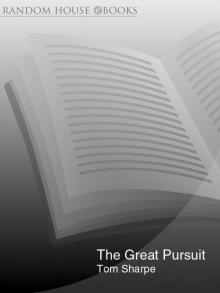 The Great Pursuit
The Great Pursuit Ancestral Vices
Ancestral Vices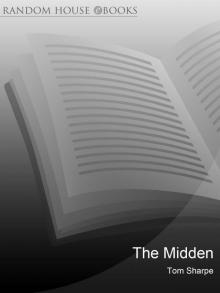 The Midden
The Midden Vintage Stuff
Vintage Stuff The Throwback
The Throwback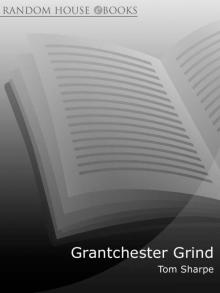 Grantchester Grind:
Grantchester Grind: Wilt on High:
Wilt on High: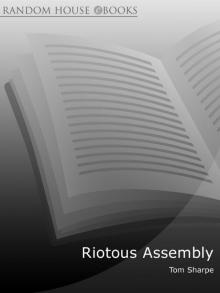 Riotous Assembly
Riotous Assembly Indecent Exposure
Indecent Exposure The Gropes
The Gropes Wilt in Nowhere:
Wilt in Nowhere: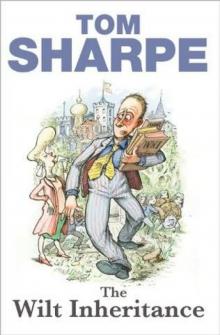 The Wilt Inheritance
The Wilt Inheritance Wilt:
Wilt: The Wilt Alternative
The Wilt Alternative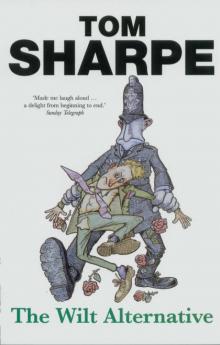 The Wilt Alternative w-2
The Wilt Alternative w-2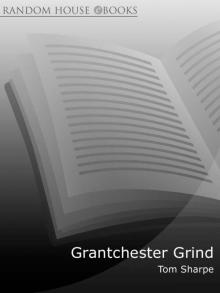 Grantchester Grind
Grantchester Grind Wilt on High
Wilt on High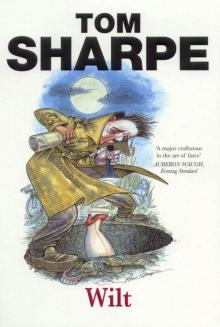 Wilt w-1
Wilt w-1 Wilt
Wilt The Wilt Inheritance (2010)
The Wilt Inheritance (2010) Wilt in Nowhere
Wilt in Nowhere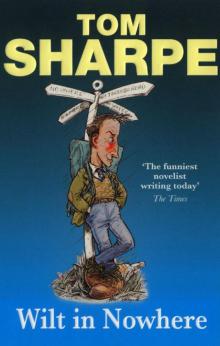 Wilt in Nowhere w-5
Wilt in Nowhere w-5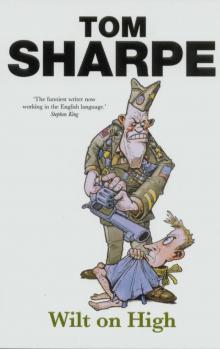 Wilt on High w-3
Wilt on High w-3